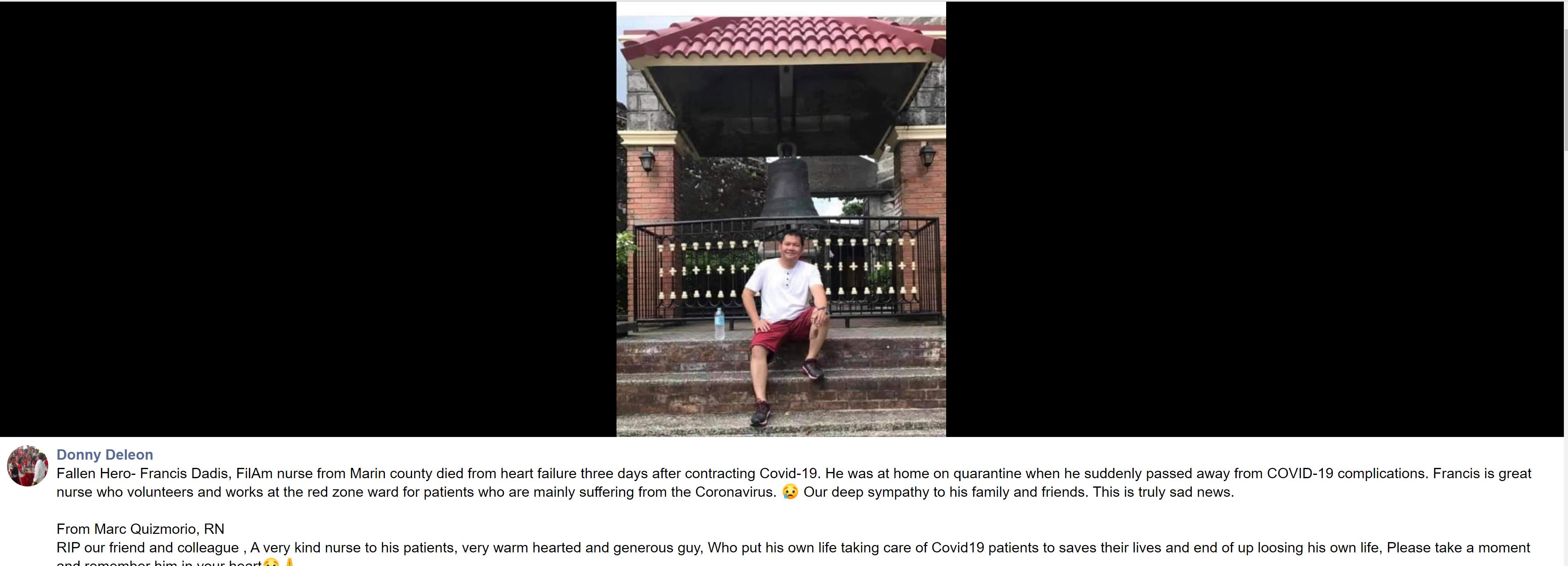COVID Health Care: Virus Taking Deadly Toll On Filipino American Nurses
SAN FRANCISCO (CBS SF/CNN) -- Anyone who has spent time as a patient inside a San Francisco Bay Area hospital is well aware of the great care they received from Filipino American nurses. A new report reveals the devastating toll COVID has taken on their colleagues locally and across the country.
According to a September report, nearly a third of the nurses who've died of coronavirus in the United States are Filipino, even though Filipino nurses make up just 4% of the nursing population nationwide.
It's a jarring statistic researchers are working to understand and a tragedy families across the country are living with every day.
Among those who have died is Francis Dadis, a Marin County nurse who died after contracting the disease.
Jhulan Banago feels it when he visits his mom's grave site every week and when he keeps putting out a plate of food for her at the dinner table every night.
Tiffany Olega felt it when she walked through the gates of Disneyland and collapsed to the ground, crying as she set foot in one of her mom's favorite places for the first time after her death.
Jollene Levid feels it every morning, when she combs through health-care workers' obituaries and keeps finding Filipino names. She sees her family in their faces -- so many senseless deaths.
"People always talk about it as numbers, but then when so many of the folks you know have died, and it wasn't because they weren't wearing a mask, it wasn't because they decided to eat at a restaurant. They were literally trying to keep someone alive and they caught it," Levid says.
"You have to ask, why is this happening to our community?" she adds. "There are so many factors, but I would assert that every death was preventable, which is what makes it so much harder."
Zenei Cortez, co-president of National Nurses United, says the news devastates her not just as a leader of the largest nurses' union in the United States, but as a Filipino American who knows firsthand how hard nurses are working on the front lines -- often without proper protection.
In a September report, the union found that 67 of the 213 registered nurses who'd died of COVID-19 and related complications in the United States were Filipino. Since then, Cortez says, the death toll has grown.
The union's latest analysis of nurses' deaths for which race and ethnicity data was available found that 74 of 245 nurses who'd died were Filipino, or roughly 30%. The toll includes nurses who were born in the Philippines and immigrated to the United States, and Filipino American nurses born in the U.S.
"I'm very concerned and I'm very heartbroken," Cortez says, "because these deaths are unnecessary."
Levid begins each day with a tragic task: searching news clippings to find the names of Filipino health care workers who've died. Her mission: working with a team of volunteers to confirm the details with multiple sources, then placing them on a website where they're compiling data and photos of those who've lost their lives in the pandemic.
The site is called Kanlungan, which means shelter or refuge. Levid describes it as a memorial. It's also, in a sense, a warning.
"We wanted to make sure that we were bringing dignity to people who have passed away saving others' lives. And we were hoping to collect data also, because people need dignity in the workplace now," she says. "If nobody was collecting the information about how many have fallen to covid, we knew there would be no guarantee that the living would get the protection they need."
Rosary Castro-Olega, a Filipina American who was born and raised in California, had already retired from a decades-long career as a nurse in Los Angeles. But when a cruise she'd been scheduled to take in March was canceled and she heard hospitals needed help, she had no doubt about where she was supposed to be.
Castro-Olega headed to work.
"She was always there helping, no matter if she was feeling ill herself or tired or if she just finished a 12-hour shift, she'd still go out to help somebody," says Tiffany Olega, her oldest daughter.
When Castro-Olega died in March, she was the first health care professional to die of Covid-19 in Los Angeles County. And her name was the first added to the Kanlungan website.
This year, her grieving family celebrated her birthday at home without her. They wrote messages on purple balloons and lit candles as a memorial. Next year, they plan to celebrate it at Disneyland, wearing T-shirts with her photo beside a hashtag: #FallenHeroes.




